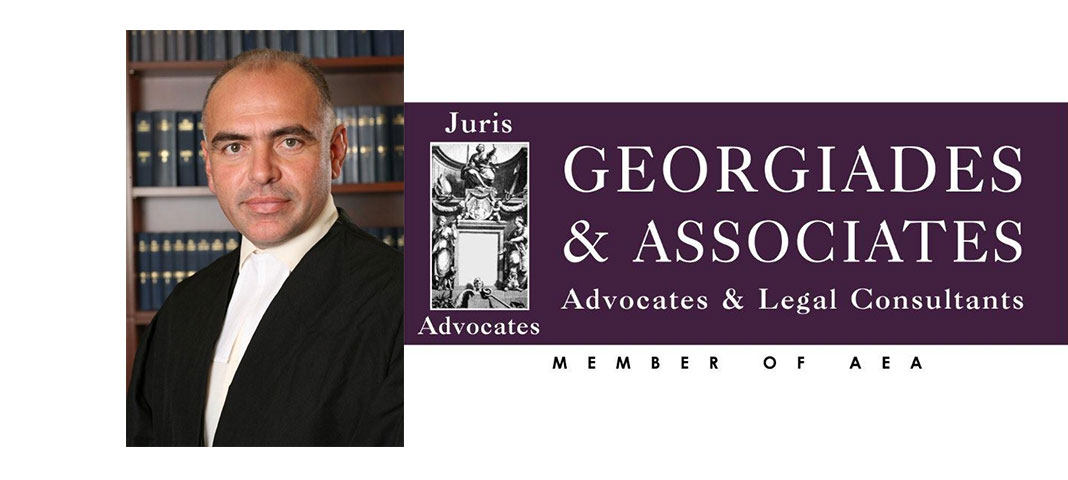ΣΤΟ ΕΠΑΡΧΙΑΚΟ ΔΙΚΑΣΤΗΡΙΟ ΑΜΜΟΧΩΣΤΟΥ
ΑΡ. ΥΠΟΘ. 1912/2009
ΜΕΤΑΞΥ
1. CORNELIUS DESMOND O’DWYER, εξ Αγγλίας
2. MICHAELLA MARGARET O’DWYER, εξ Αγγλίας
ΚΑΤΗΓΟΡΟΥΣΑΣ ΑΡΧΗΣ
KAI
1. CHRISTOFOROS KARAYIANNAS & SONS
2. ΧΡΙΣΤΟΦΟΡΟΣ ΚΑΡΑΓΙΑΝΝΑΣ
3. ΜΑΡΙΟΣ ΚΑΡΑΓΙΑΝΝΑΣ
4. MICHELLE MC DONALD
ΚΑΤΗΓΟΡΟΥΜΕΝΩΝ
ΓΡΑΠΤΗ ΑΓΟΡΕΥΣΗ ΚΑΤΗΓΟΡΟΥΣΑΣ ΑΡΧΗΣ
Έντιμη κ. Δικαστή,
Προβαίνουμε στην παρούσα αγόρευση μας προς υποστήριξη της θέσης μας ότι βάσει της μαρτυρίας που έχει προσκομιστεί ενώπιον σας, οι Κατηγορούμενοι 1, 2, 3 και 4 είναι ένοχοι για το αδίκημα της δόλιας συναλλαγής σε ακίνητη περιουσία που ανήκει σε άλλον, κατά παράβαση του Άρθρου 303Α του Ποινικού Κώδικα.
Το Δικαστήριο μετά την παρουσίαση της μαρτυρίας της Κατηγορούσας Αρχής, αποφάσισε ότι υπάρχει εκ πρώτης όψεως υπόθεση, απορρίπτοντας τους ισχυρισμούς του δικηγόρου των Κατηγορουμένων, ότι απουσίαζαν τα συστατικά στοιχεία του αδικήματος. Συνοπτικά οι θέσεις του δικηγόρου των Κατηγορουμένων ήταν ότι, έχει τερματιστεί μονομερώς η Συμφωνία πώλησης του ακινήτου και ότι ο κύριος και η κυρία O’Dwyer, παρόλο που κατέθεσαν στο Κτηματολόγιο την Συμφωνία αγοράς του ακινήτου, δεν κατέστησαν οι ιδιοκτήτες του ακινήτου, κάτι που δεν συνάδει με την ισχύουσα Νομολογία.
ΣΥΣΤΑΤΙΚΑ ΣΤΟΙΧΕΙΑ ΤΟΥ ΑΔΙΚΗΜΑΤΟΣ – ΑΡΘΡΟ 303Α ΠΟΙΝΙΚΟΥ ΚΩΔΙΚΑ
Για σκοπούς της αγόρευσης θεωρώ σκόπιμο να αναφερθώ στα συστατικά στοιχεία του αδικήματος και να τα αναλύσω.
Συγκεκριμένα στο Άρθρο 303Α που τιτλοφορείται «Δόλιες συναλλαγές σε ακίνητη περιουσία που ανήκει σε άλλο» προβλέπει τα ακόλουθα:
“303A (1) Πρόσωπο το οποίο, με σκοπό καταδολίευσης, συναλλάττεται σε ακίνητη περιουσία που ανήκει σε άλλο είναι ένοχος κακουργήματος και υπόκειται σε φυλάκιση εφτά χρόνων.
(2) Για τους σκοπούς του παρόντος άρθρου πρόσωπο συναλλάτεται σε ακίνητη περιουσία όπου –
(α) Πωλεί σε άλλο, ή ενοικιάζει σε άλλο, ή υποθηκεύει σε άλλο ή επιβαρύνει με οποιοδήποτε τρόπο, ή διαθέτει προς χρήση σε άλλο ακίνητη περιουσία, ή
(β) διαφημίζει ή άλλως πως προωθεί τη σε άλλο πώληση ή ενοικίαση ή υποθήκευση ή επιβάρυνση με οποιοδήποτε τρόπο ή την από άλλο χρήση ακίνητης περιουσίας, ή
(γ) συνάπτει συμφωνία για την πώληση σε άλλο, ή την ενοικίαση σε άλλο, ή την υποθήκευση σε άλλο, ή την επιβάρυνση με οποιονδήποτε τρόπο προς όφελος άλλου, ή τη χρήση από άλλον ακίνητης περιουσίας, ή
(δ) αποδέχεται την ακίνητη περιουσία η οποία αποτελεί το αντικείμενο της συναλλαγής όπως αυτής ορίζεται στο παρόν εδάφιο.
(3) Για τους σκοπούς του παρόντος άρθρου, πρόσωπο ενεργεί με σκοπό καταδολίευσης εάν προβεί σε οποιαδήποτε από τις πράξεις που καθορίζονται στο εδάφιο (2) ενώ γνωρίζει ή, υπό τις περιστάσεις, έπρεπε εύλογα να γνωρίζει, ότι δεν έχει τη συγκατάθεση του εγγεγραμμένου ιδιοκτήτη της ακίνητης περιουσίας, ή οποιαδήποτε άλλου προσώπου που έχει νόμιμη εξουσία παροχής τέτοιας συγκατάθεσης.
(4) Η απόπειρα διάπραξης…
(5) Το παρόν άρθρο ουδόλως επηρεάζει…
(6) Οι διατάξεις του άρθρου 8 δεν εφαρμόζονται σε ποινική δίωξη που ασκήθηκε δυνάμει του άρθρου αυτού.”
Από τη γραμματική διατύπωση του Άρθρου 303Α συνάγεται, ότι τα συστατικά στοιχεία του αδικήματος της δόλιας συναλλαγής σε ακίνητη περιουσία που ανήκει σε άλλον είναι τα ακόλουθα:
1. Το να συναλλάττεται κάποιος σε ακίνητη περιουσία
2. Η ακίνητη περιουσία να ανήκει σε άλλον.
3. Η συναλλαγή να πραγματοποιείται με σκοπό καταδολίευσης.
ΣΥΝΑΛΛΑΓΗ ΣΕ ΑΚΙΝΗΤΗ ΠΕΡΙΟΥΣΙΑ
Το 1ο συστατικό στοιχείο του αδικήματος, δηλαδή το να συναλλάττεται κάποιος, διευκρινίζεται στην παράγραφο 2 του Άρθρου, όπου μεταξύ άλλων αναφέρεται ότι συναλλάτεται, όποιος πωλεί ή διαθέτει προς χρήση σε άλλον ακίνητη περιουσία, ή όποιος συνάπτει συμφωνία για την πώληση σε άλλον ή τη χρήση από άλλον ακίνητης περιουσίας, ή όποιος αποδέχεται την ακίνητη περιουσία η οποία αποτελεί το αντικείμενο της συναλλαγής.
Συγκεκριμένα, όπως προκύπτει από την μαρτυρία που τέθηκε ενώπιον σας και ιδιαιτέρως από το Τεκμήριο 8 με τίτλο Legal Undertaking to Sell and Purchase, οι Κατηγορούμενοι 1, 2 & 3 έχουν προβεί σε μια από τις πράξεις συναλλαγής, που προβλέπει το εδάφιο (2) του Άρθρου 303Α στην οικία υπ’ αριθμ. 30, του συγκροτήματος Άγιος Σέργιος, με την Κατηγορούμενη 4.
Το ως άνω έγγραφο (Τεκμήριο 8), σύμφωνα και με την μαρτυρία του κου O’Dwyer η οποία δεν αμφισβητήθηκε από τους Κατηγορούμενους, ήταν επισυνημμένο ως Τεκμήριο Μ σε ένορκο δήλωση του Κατηγορουμένου 3, προς υποστήριξη ex–parte αίτησης της Κατηγορουμένης 1, στα πλαίσια της Αγωγής υπ’ αριθμ. 927/2007.
Περαιτέρω, μεταξύ άλλων στην εν λόγω συμφωνία περιέχονται τα ακόλουθα:
“1. The 1st Party hereby states and agrees to sell the aforesaid property to the 2nd Party and the 2nd Party hereby agrees to purchase the aforesaid property from the 1st Party.
2. The 1st Party hereby legally undertakes to sell to the 2nd Party the property as more particularly stated in the attached architectural plans, for the sum of One Hundred and Eighty Thousand Pounds Cyprus.
6. The 2nd Party hereby legally undertakes to purchase the said property for the sum of One Hundred and Eighty Thousand Pounds Cyprus.”
Επιπρόσθετα, όπως προκύπτει από τη μαρτυρία που δόθηκε ενώπιον σας από τον κον O’Dwyer, σε επίσκεψη που έκανε στο συγκρότημα στις 14/1/2008, διαπίστωσε ότι η Κατηγορούμενη 4 κατοικούσε στην οικία του. Προς υποστήριξη των όσων ανέφερε και δεν αμφισβητήθηκαν κατά την αντεξέταση του, προσκόμισε στο Δικαστήριο σας φωτογραφία που απεικονίζει την Κατηγορούμενη 4 να βρίσκεται μέσα στην αυλή της οικίας του, κρατώντας στο χέρι της το κινητό της τηλέφωνο.
Ενόψει των ανωτέρω, υπάρχει ικανοποιητική μαρτυρία πέραν πάσης αμφιβολίας, προς στοιχειοθέτηση του 1ου συστατικού στοιχείου του αδικήματος, δηλαδή της ύπαρξης συναλλαγής σε ακίνητη περιουσία από τους Κατηγορούμενους.
Η ΑΚΙΝΗΤΗ ΠΕΡΙΟΥΣΙΑ ΝΑ ΑΝΗΚΕΙ ΣΕ ΑΛΛΟΝ
Περαιτέρω, αναφορικά με το 2ο συστατικό στοιχείο του αδικήματος, δηλαδή το να ανήκει η ακίνητη περιουσία σε άλλον λεκτέα είναι τα ακόλουθα. Στην υπόθεση, 1. Αντρίκκος Νίκου Χρίστου 2. Ελένη Αντρίκκου ν. Γιώργου Γεωργίου 1 Α.Α.Δ. (1999), σελ. 940 αναφέρθηκαν τα ακόλουθα σχετικά με τη νομική θέση του προσώπων που εγγράφουν πωλητήριο συμβόλαιο ακινήτου στο Κτηματολόγιο.
“Εφόσον οι εφεσείοντες απέκτησαν, με την εγγραφή του συμβολαίου στα κτηματολογικά αρχεία, δικαίωμα ειδικής εκτέλεσης της σύμβασης, κατέστησαν οι ιδιοκτήτες της γης, κατά το δίκαιο της επιείκειας, και ο πωλητής εξ επαγωγής εμπιστευματοδόχος (constructive trustee) των δικαιωμάτων τους, τηρουμένων των αντίστοιχων δικαιωμάτων και υποχρεώσεων βάσει της σύμβασης. Η αρχή αυτή απεικονίζεται ως εξής στο σύγγραμμα “Snell’s Equity”, p. 195:-
“As soon as specifically enforceable contract for the sale of land is made, the purchaser becomes the owner of the land in equity, and the vendor becomes a constructive trustee of the land for the purchaser, subject in each case to their respective rights and duties under the contract.
Στην Κύπρο, όπως έχουμε εξηγήσει, δικαίωμα ειδικής εκτέλεσης κτάται μόνο με την εγγραφή της σύμβασης πώλησης βάσει του ΚΕΦ.232. Καθίσταται πρόδηλο ότι οι εφεσείοντες απέκτησαν όχι μόνο κατοχή του διαμερίσματος αλλά και το δικαίωμα ιδιοκτησίας του.”
(υπογραμμίσεις δικές μας).
Υπό το φως της ως άνω νομολογίας του Ανωτάτου Δικαστηρίου και λαμβάνοντας υπόψη το γεγονός ότι οι Παραπονούμενοι καταχώρησαν το πωλητήριο έγγραφο της οικίας Τεκμήριο 1 στο Κτηματολόγιο, όπως προκύπτει από την αναντίλεκτη μαρτυρία του λειτουργού του Κτηματολογίου κ. Πετεινάρη, οι Παραπονούμενοι κατέστησαν οι ιδιοκτήτες του ακινήτου.
Περαιτέρω, όπως ανέφερε ο κ. Πετεινάρης, κατά την αντεξέταση του, με την καταχώρηση του πωλητηρίου εγγράφου στο Κτηματολόγιο «κατοχυρώνεται ο αγοραστής να μη μπορεί να το πωλήσει ξανά ο πωλητής».
Σχετική με την πιο πάνω δήλωση του κ. Πετεινάρη, σύμφωνα με την οποία, η εγγραφή της σύμβασης, βάσει του ΚΕΦ. 232, δημιουργεί κώλυμα στη διάθεση του διαμερίσματος από τον πωλητή σε οποιοδήποτε άλλο πρόσωπο, είναι και η απόφαση Δρυάδης κ.α. ν. Καλησπέρα (1998) 1Β Α.Α.Δ. 881, όπου στην σελίδα 891, αναφέρονται τα ακόλουθα:
“Το διαμέρισμα είχε πωληθεί σε τρίτους, οι οποίοι είχαν εγγράψει τη σύμβαση, βάσει του ΚΕΦ. 232, παρεμβάλλοντας κώλυμα στη διάθεση του διαμερίσματος από τον εφεσίβλητο στους εφεσείοντες ή σε οποιαδήποτε άλλο.”
Επιπρόσθετα, ο κ. Πετεινάρης, ανέφερε κατά την αντεξέταση του, ότι για να μπορέσει να γίνει αποδεκτό ένα πωλητήριο έγγραφο, που αφορά πώληση ακινήτου σε δεύτερο αγοραστή, είναι απαραίτητη η συγκατάθεση του πρώτου αγοραστή.
Πλέον τούτων, όπως προκύπτει από το Τεκμήριο 10, αντίγραφο από την ιστοσελίδα της ίδιας της Κατηγορουμένης 1, αναφέρονται σχετικά με το θέμα της καταχώρησης του πωλητηρίου εγγράφου στο Κτηματολόγιο και τα δικαιώματα που πηγάζουν από αυτή την καταχώρηση, τα ακόλουθα:
“10) How long after delivery can I expect to receive my title deeds?
Title Deeds generally take a minimum of two to four years depending on the property purchase. This does not mean that you cannot sell your property at any time before that. From the minute your contract of sale is registered at the land registry department the property is officially yours and you can sell your property the next minute.”
Ενόψει των ανωτέρων και με δεδομένο ότι οι Παραπονούμενοι από την καταχώρηση του πωλητηρίου συμβολαίου στο Κτηματολόγιο κατέστησαν ιδιοκτήτες του ακινήτου, οι Κατηγορούμενοι 1, 2 και 3 με την εκ νέου πώληση της οικίας στην Κατηγορουμένη 4, η οποία την αποδέχτηκε, συναλλάχθηκαν σε ακίνητη περιουσία που ανήκε σε άλλους, δηλαδή τους Παραπονούμενους.
ΣΚΟΠΟΣ ΚΑΤΑΔΟΛΙΕΥΣΗΣ
Επίσης, σύμφωνα με την παράγραφο 3, πρόσωπο ενεργεί με σκοπό καταδολίευσης εάν προβεί σε οποιαδήποτε από τις πράξεις που καθορίζονται στο εδάφιο (2) ενώ γνωρίζει και/ή υπό τις περιστάσεις, έπρεπε εύλογα να γνωρίζει, ότι δεν έχει τη συγκατάθεση του εγγεγραμμένου ιδιοκτήτη της ακίνητης περιουσίας, ή οποιαδήποτε άλλου προσώπου που έχει νόμιμη εξουσία παροχής τέτοιας συγκατάθεσης.
Αναφορικά με τον σκοπό καταδολίευσης των Κατηγορουμένων, παραπέμπουμε αρχικά στο Τεκμήριο 8 όπου αναφέρονται τα ακόλουθα:
“B. Whereas the 1st Party has sold the above stated property to a third pαrty …
4. Whereas the 2nd Party hereby undertakes to purchase the aforesaid property from the 1st Party within thirty days, commencing form the date of cancellation and withdrawal of the contract of sale of the third party, which is presently registered at the land registry department in relation to the property as more particularly stated herein.
11. It is agreed between the Parties that in the event that the contract of sale of the Third Party is not removed and or cancelled from the register of the land registry department by the 30th of December 2010 the following options may be exercised by the 2nd Party”.
Πέραν όμως από το τεκμήριο 8, ο σκοπός καταδολίευσης των Κατηγορουμένων και κυρίως της Κατηγορουμένης 4, προκύπτει και από το γεγονός ότι οι Παραπονούμενοι απέστειλαν τόσο οι ίδιοι, όσο και μέσω των δικηγόρων τους, επιστολές με τους οποίες γνωστοποιούσαν στην Κατηγορουμένη 4, ότι αυτοί είναι οι νόμιμοι ιδιοκτήτες της επίδικης οικίας. Συγκεκριμένα, οι Παραπονούμενοι απέστειλαν οι ίδιοι προσωπικά την ηλεκτρονική επιστολή ημερομηνίας 19.3.2007 Τεκμήριο 5 και κατόπιν τούτου την επιστολή ημερομηνίας 17.5.2007 διαμέσου των δικηγόρων τους Αντώνης Ανδρέου & Σια, Τεκμήριο 6, η οποία επιδόθηκε προσωπικά στην Κατηγορουμένη 4 στις 19.5.2007.
Οι Κατηγορούμενοι εξάσκησαν το δικαίωμα τους να μην μαρτυρήσουν και να αντεξεταστούν, αλλά ούτε έκαναν γραπτή δήλωση. Η μόνη μαρτυρία που προσκομίστηκε από τους Κατηγορούμενους, ήταν αυτή του κου Πιττάτζη, ο οποίος κατάθεσε δύο επιστολές τις οποίες θα σχολιάσω στην συνέχεια.
Σχετικά με το δικαίωμα των Κατηγορουμένων να μην δώσουν μαρτυρία από το εδώλιο του Κατηγορουμένου και κατά συνέπεια να αποφύγουν τη βάσανο της αντεξέτασης, υπάρχει σημαντική Νομολογία, τόσο Κυπριακή όσο και Αγγλική, στην οποία παρατηρείται μια συνακολουθία στον τρόπο που τα Δικαστήρια πρέπει να χρησιμοποιούν και να ερμηνεύουν την ανώμοτη κατάθεση του Κατηγορουμένου ή την απόλυτη σιωπή του, για να φτάσουν σε εύρημα ενοχής ή μη ενοχής.
Σαν γενικός κανόνας που προκύπτει από την Νομολογία είναι ότι ο Κατηγορούμενος έχει κάθε δικαίωμα να μην δώσει ένορκη μαρτυρία από το εδώλιο του Κατηγορουμένου και απλά να προβεί είτε σε ανώμοτη δήλωση, ή ακόμη και να μην αναφέρει τίποτα στο δικαστήριο, αφήνοντας την Κατηγορούσα Αρχή να αποδείξει την υπόθεση της, ενόψει και του τεκμηρίου αθωότητας ενός Κατηγορουμένου και της υποχρέωσης της Κατηγορούσας Αρχής να αποδείξει την ενοχή του πέρα πάσης λογικής αμφιβολίας.(βλ. μεταξύ άλλων Vrakas & Another v. Republic (1973) 2 C.L.R. 139, 188-191, Anastasiades v. Republic (1977) 2 C.L.R. 97, σελ. 113, 215, Khadar v. Republic (1978) 2 C.L.R. 152, 245-288, Δημοσθένους κ.ά. v. Αστυνομίας (1998) 2 Α.Α.Δ. 129 και Ιωάννου κ.ά. v. Δημοκρατίας (2001) 2 Α.Α.Δ. 195).
Παρόλο που το δικαίωμα του Κατηγορουμένου να αρνηθεί να δώσει οποιαδήποτε ένορκη μαρτυρία είναι αναντίλεκτο και αναμφισβήτητο, σε κάποιες περιπτώσεις, όπως με σαφήνεια ορίζονται στην Νομολογία, το Δικαστήριο θα πρέπει να λάβει σοβαρά υπόψιν του στην ετυμηγορία του, το γεγονός της άρνησης του Κατηγορουμένου να δώσει ένορκη μαρτυρία στο δικαστήριο.
Σχετική είναι η υπόθεσηVrakas & Another v. Republic (1973) 2 C.L.R. 139, 188-191, στην οποία το δικαστήριο κάνοντας μια αναδρομή στην Αγγλική νομολογία επί του θέματος, δήλωσε ότι: “In the light of all the foregoing we have no hesitation in holding that Appellant 1 was rightly convicted of the premeditated murder of his wife. In this respect it is to be noted that at his trial Appellant 1 chose, as it was his right to do, not to give evidence on oath, but to make an unsworn statement from the dock; he stated, inter alia, that he was innocent and that he had no reason to kill his wife. Without, in the least, departing from, or doubting, the principle that it is not to be expected of an accused person to prove his innocence, but it is up to the prosecution to establish his guilt beyond reasonable doubt, we are of the view that the failure of Appellant 1, as an accused, to give evidence in his own defense is a factor related, in the circumstances of the present case, to the issue of his guilt.”
Επίσης, στην υπόθεση R. v. Corrie and Watson ([1904] 68 J.P. 294), το Δικαστήριο επικυρώνοντας την καταδίκη του Κατηγορουμένου για την κατηγορία του παράνομου στοιχήματος δήλωσε χαρακτηριστικά:” I agree that no inference ought to be drawn in support of a weak case on the ground that the defendants were not called to give evidence; but where transactions are proved which are capable of an innocent explanation, and if the defendants could have given it, and there is prima facie evidence that the person is carrying on an illegal business, I do not think it improper for the jury to draw a conclusion from the fact that the defendants were not called”.
Πρόσθετα, μια κατατοπιστική απόφαση η οποία επεξηγεί ποιά θα πρέπει να είναι εκείνα τα γεγονότα ή χαρακτηριστικά μιας υπόθεσης τα οποία θα οδηγήσουν το δικαστήριο να συνυπολογίσει στο πόρισμα της ενοχής, την άρνηση του Κατηγορουμένου να καταθέσει ενόρκως, είναι η R. v. Burdett [1820] 4 B. and Ald. 95, at p. 120)’. ” No person is to be required to explain or contradict until enough has been proved to warrant a reasonable and just conclusion against him, in the absence of explanation or contradiction; but when such proof has been given, and the nature of the case is such as to admit of explanation or contradiction if the conclusion to which the prima facie case tends be true, and the accused offers no explanation or contradiction, can human reason do otherwise than adopt the conclusion to which the proof tends?” .
Στην πρόσφατη υπόθεση Κρίνος Θεοχάρους v Κυπριακής Δημοκρατίας (2008) 2 Α.Α.Δ 22 το δικαστήριο διευκρίνισε περαιτέρω το νομικό καθεστώς που διέπει την άρνηση του κατηγορουμένου να δώσει ένορκη κατάθεση και να προβεί σε ανώμοτη δήλωση, ιδιαίτερα στις περιπτώσεις εκείνες όπου επίδικο θέμα είναι η ένοχη γνώση (mens rea) του κατηγορουμένου: “Υπενθυμίζουμε ότι στην παρούσα υπόθεση οι κατηγορούμενοι (συμπεριλαμβανομένου και του εφεσείοντα) αφού κλήθηκαν σε απολογία επέλεξαν να προβούν σε ανώμοτη δήλωση και να μην προσκομίσουν οποιαδήποτε μαρτυρία, κάτι βέβαια που ήταν απόλυτο δικαίωμα τους. Σε τέτοια περίπτωση, ενόψει και του τεκμηρίου αθωότητας ενός κατηγορουμένου και της υποχρέωσης της Κατηγορούσας Αρχής να αποδείξει την ενοχή του πέραν πάσης λογικής αμφιβολίας, αυτό που εξετάζεται είναι (α) αν η μαρτυρία που παρουσίασε η κατηγορούσα αρχή είναι αξιόπιστη και (β) αν ναι, κατά πόσο είναι ικανοποιητική για να αποδείξει τις κατηγορίες. Το γεγονός ότι ένας κατηγορούμενος δεν έδωσε ο ίδιος ένορκη κατάθεση ή ότι δεν παρουσίασε μάρτυρες, δεν πρέπει να θεωρείται ότι συμπληρώνει τυχόν κενά της μαρτυρίας της Κατηγορούσας Αρχής. Η ανώμοτη δήλωση ενός κατηγορουμένου εξετάζεται και αξιολογείται μέσα στο σύνολο της μαρτυρίας, ανάλογα και με το πώς ταιριάζει στην κάθε συγκεκριμένη περίπτωση. Δεν μπορεί όμως να εξομοιωθεί με μαρτυρία με την έννοια να είναι ικανή να αντικρούσει μια ένορκη μαρτυρία που κρίθηκε ήδη από το δικαστήριο ως αξιόπιστη. (βλ μεταξύ άλλων Vrakas & Another v. Republic (1973) 2 C.L.R. 139, 188-191, Anastasiades v. Republic (1977) 2 C.L.R. 97, σελ. 113, 215, Khadar v. Republic (1978) 2 C.L.R. 152, 245-288, Δημοσθένους κ.ά. v. Αστυνομίας (1998) 2 Α.Α.Δ. 129 και Ιωάννου κ.ά. v. Δημοκρατίας (2001) 2 Α.Α.Δ. 195). Στο γενικό αυτό κανόνα υπάρχουν κάποιες εξαιρέσεις όπου τα γεγονότα όπως τα απέδειξε με τη μαρτυρία της η Κατηγορούσα Αρχή είναι τέτοια που χρήζει να δοθεί κάποια εξήγηση από τον κατηγορούμενο ιδιαίτερα εκεί που μια τέτοια εξήγηση εμπίπτει στη δική του αποκλειστική γνώση”.
Το συμπέρασμα που μπορεί να εξαχθεί από την μελέτη των πιο πάνω αποφάσεων είναι ότι το Δικαστήριο όταν έχει ενώπιον του κάποια υπόθεση στην οποία η Κατηγορούσα Αρχή προσκόμισε τέτοια στοιχεία, τα οποία αποτελούν ικανοποιητική μαρτυρία για την απόδειξη της ενοχής του Κατηγορουμένου, σε συσχετισμό και με το γεγονός ότι ο Κατηγορούμενος δεν έδωσε ένορκη μαρτυρία, ενώ τούτο ήταν επιβεβλημένο βάσει των γεγονότων της υπόθεσης, τότε το δικαστήριο θα πρέπει να προσανατολιστεί προς την έκδοση απόφασης ενοχής εναντίον του Κατηγορουμένου. Τα γεγονότα που επιβάλλουν την παροχή ένορκης κατάθεσης από τον Κατηγορούμενο, πρέπει να αφορούν ένα επίδικο θέμα για το οποίο ο Κατηγορούμενος μπορεί να δώσει κάποια εξήγηση ή διευκρίνηση, ιδιαίτερα στις περιπτώσεις όπου ο Κατηγορούμενος έχει άμεση και αποκλειστική γνώση για το συγκεκριμένο θέμα.
Ειρήσθω εν παρόδω, όπως ορίζεται στις Αγγλικές αποφάσεις που προαναφέραμε, η μαρτυρία που πρέπει να προσκομιστεί από την Κατηγορούσα Αρχή είναι ικανοποιητική για απόδειξη ενοχής, εφόσον με αυτήν αποδεικνύονται εκ πρώτης όψεως (prima facie) τα επίδικα γεγονότα (R. v. Corrie and Watson ([1904] 68 J.P. 294), R. v. Burdett (1820) 4 B. and Ald. 95, at p. 120). Θα πρέπει να τονιστεί ότι στην παρούσα υπόθεση, η Κατηγορούσα Αρχή με το μαρτυρικό υλικό που προσήψε, απέδειξε τα συστατικά του αδικήματος στην εκ πρώτης όψεως διαδικασία ενώπιον του δικαστηρίου, γεγονός το οποίο θα πρέπει να συνεκτιμηθεί από το δικαστήριο, υπό την άποψη ότι η μαρτυρία που η Κατηγορούσα Αρχή προσήψε, μπορεί να θεωρηθεί ικανοποιητική για την απόδειξη των συστατικών του αδικήματος.
Υπό το φως της ανωτέρω νομολογίας, το πρώτο στοιχείο που το ευσέβαστο σας δικαστήριο θα κληθεί να εξετάσει, είναι κατά πόσο η μαρτυρία που η Κατηγορούσα Αρχή έχει προσάψει είναι ικανοποιητική. Από τα όσα αναφέρονται στα Τεκμήρια 5, 6, 8 και 14, προκύπτει ξεκάθαρα ότι οι Κατηγορούμενοι γνώριζαν και/ή εύλογα υπό τις περιστάσεις έπρεπε να γνωρίζουν ότι δεν μπορούσαν να συναλλάττονται για το επίδικο ακίνητο, δηλαδή να καταρτίσουν την ως άνω συμφωνία χωρίς τη συγκατάθεση των Παραπονούμενων, οι οποίοι είχαν καταθέσει στο Κτηματολόγιο το πωλητήριο έγγραφο. Μάλιστα οι ίδιοι οι Κατηγορούμενοι στην παράγραφο 11 του Τεκμηρίου 8, αναγνωρίζουν ότι υπάρχει η πιθανότητα το πωλητήριο συμβόλαιο που είναι καταχωρημένο στο Κτηματολόγιο από τους Παραπονούμενους, να μην αποσυρθεί ή ακυρωθεί μέχρι την ως άνω αναφερόμενη ημερομηνία. Αναγνωρίζουν δηλαδή εμμέσως οι Κατηγορούμενοι, ότι μπορεί να κριθεί από το αρμόδιο Δικαστήριο ότι, ο τερματισμός του συμβολαίου από τους Κατηγορούμενους δεν ήταν νόμιμος και συνεπώς ότι το Δικαστήριο μπορεί να εκδώσει απόφαση υπέρ των Παραπονούμενων στην αστική υπόθεση, με την οποία να διατάσσεται η ειδική εκτέλεση της σύμβασης υπέρ των Παραπονούμενων.
Αποκορύφωμα του σκοπού καταδολίευσης είναι το Τεκμήριο 14 που παρουσίασε ο κος Πιττάτζης. Είναι αξιοσημείωτο ότι ο κος Πιττάτζης εκ μέρους των πελατών του με επιστολή του ημερ. 10/4/2006 λέει τα εξής:
«…Even for any reason in the end of the day it is decided that they had no legal ground to cancel it due to your behavior they do not want you in their property and they hereby notify you that they are not willing to complete the house and deliver it to you.»…
Πέραν τούτου, ως φαίνεται από το Τεκμήριο 14, δεν είχαν κανένα σκοπό οι Κατηγορούμενοι 1, 2 & 3 να δώσουν το σπίτι στον κύριο και στην κυρία O’Dwyer, και παράνομα το πώλησαν και/ή το έδωσαν προς χρήση στην Κατηγορούμενη 4, η οποία γνώριζε ότι το σπίτι ανήκει στους Παραπονούμενους.
Ενώ λοιπόν οι Κατηγορούμενοι γνώριζαν και ή όφειλαν υπό τις περιστάσεις να γνωρίζουν, ότι οι Παραπονούμενοι είχαν καταθέσει το πωλητήριο έγγραφο στο Κτηματολόγιο και ότι μόνο το Δικαστήριο θα μπορούσε να κρίνει το νόμιμο ή όχι του τερματισμού του πωλητηρίου συμβολαίου και συνακόλουθα την δέσμευση του από αυτό, αυτοί προχώρησαν κατά παράβαση του Άρθρου 303Α του Ποινικού Κώδικα σε συναλλαγή επί του επίδικου ακινήτου, χωρίς τη συγκατάθεση των Παραπονούμενων, οι οποίοι είχαν καταθέσει το πωλητήριο έγγραφο στο Κτηματολόγιο, ακριβώς για τον σκοπό εξασφάλισης των εμπραγμάτων δικαιωμάτων τους επί του ακινήτου και για την αποφυγή καταστάσεων όπως αυτών στις οποίες περιέπεσαν. Είναι ξεκάθαρο ότι η Κατηγορούμενη 4 δεν θα μπορούσε να αγοράσει ή να χρησιμοποιήσει το ακίνητο χωρίς τη συγκατάθεση των νόμιμων ιδιοκτητών, οι οποίοι είναι οι Παραπονούμενοι.
Περαιτέρω, αναφορικά με τη φύση της μαρτυρίας που είναι ικανή να αποδείξει την ένοχη γνώση (mens rea) ενός Κατηγορουμένου για ένα επίδικο θέμα, σχετική είναι η υπόθεση Κρίνος Θεοχάρους v Κυπριακής Δημοκρατίας (2008) 2 Α.Α.Δ 22: “Ορθά επισήμανε το Κακουργιοδικείο ότι η ένοχη γνώση είναι κάτι που συνήθως συμπεραίνεται από τα γεγονότα. Οι «κρυφοί» λογαριασμοί, όπως χαρακτηρίστηκαν από το Κακουργιοδικείο, έδειχναν την ένοχη γνώση του εφεσείοντα και των λοιπών συγκατηγορουμένων του”.
Σε άλλο σημείο της ίδιας υπόθεσης το Δικαστήριο τόνισε τα εξής: “Εξετάσαμε με προσοχή την πρωτόδικη απόφαση και καταλήγουμε ότι η απόφαση του Κακουργιοδικείου, ότι ο εφεσείων όταν εξέδιδε το σχετικό πιστοποιητικό στο οποίο βασίστηκε η αίτηση Α716/00, το έπραττε γνωρίζοντας ότι αυτό ήταν ψευδές, είναι ορθή. Η παρατήρηση του Κακουργιοδικείου ότι η γνώση δεν είναι κάτι που μπορεί να αποδεικνύεται πάντοτε με άμεση μαρτυρία αλλά εξυπακούεται από τα περιστατικά της κάθε υπόθεσης υποστηρίζεται από τη νομολογία και συγγράμματα στα οποία αναφέρθηκε το Κακουργιοδικείο (βλ. Youssef ν. Δημοκρατίας (1993) 2 Α.Α.Δ. 289, 295 και Archbold Criminal Pleadings Evidence and Practice 36η έκδοση, σελ. 364, παραγρ. 10-10).
Συνεχίζοντας το δικαστήριο ανέφερε:”Στην υπόθεση Ιακώβου ν. Δημοκρατίας (1991) 2 Α.Α.Δ. 211, 219 λέχθηκε ότι «η ύπαρξη της απαραίτητης γνώσης δεν είναι κάτι που συνήθως αποδεικνύεται με άμεση μαρτυρία. Κατά κανόνα συμπεραίνεται από τα ιδιαίτερα περιστατικά της κάθε υπόθεσης”.
Κατά την ταπεινή μας άποψη το βάρος της μαρτυρίας που έχει προσκομίσει η Κατηγορούσα Αρχή είναι τέτοιο, που αποδεικνύει ότι οι Κατηγορούμενοι γνώριζαν και/ή όφειλαν να γνωρίζουν ότι δεν είχαν την συγκατάθεση του κυρίου και της κυρίας O’Dwyer για να συναλλάσσονται για την ακίνητη περιουσία των Παραπονούμενων, ιδιαίτερα αν ληφθεί υπόψιν ότι οι Κατηγορούμενοι δεν προσήψαν οποιαδήποτε ικανά στοιχεία ώστε να την αντικρούσουν, με αποτέλεσμα να θεωρείται ότι η ένοχη γνώση των Κατηγορουμένων έχει αποδειχθεί. Τα επί μέρους γεγονότα και περιστατικά όπως τα ανέδειξε και απέδειξε η Κατηγορούσα Αρχή με την μαρτυρία της, είναι ικανά, ορώμενα εις την ολότητα τους, να οδηγήσουν κάθε Δικαστήριο στο συμπέρασμα ότι οι Κατηγορούμενοι γνώριζαν ή έπρεπε να γνωρίζουν υπό τις περιστάσεις ότι, όταν συναλλάσσονταν με το ακίνητο των Παραπονούμενων, δεν είχαν την συγκατάθεση τους να πράξουν κάτι τέτοιο. Συνεπώς στην παρούσα υπόθεση, εφόσον η Κατηγορούσα Αρχή απέδειξε όλα αυτά τα γεγονότα ή τις περιστάσεις, βάσει των οποίων οι Κατηγορούμενοι όφειλαν να γνωρίζουν ότι δεν είχαν την συγκατάθεση των Παραπονούμενων για να συναλλάσσονται με την ακίνητη τους περιουσία, σε συσχετισμό με το γεγονός ότι οι Κατηγορούμενοι δεν προσήψαν οποιαδήποτε μαρτυρία για να αντικρούσουν την απόδειξη των εναντίον τους αυτών ενοχοποιητικών γεγονότων και περιστατικών, τότε το συμπέρασμα που μπορεί να συναχθεί είναι ότι η Κατηγορούσα Αρχή έχει αποδείξει πέρα πάσης λογικής αμφιβολίας τον σκοπό καταδολίευσης των Κατηγορουμένων.
Περαιτέρω, λαμβανομένων υπόψιν τόσο της ισχυρής μαρτυρίας που η Κατηγορούσα Αρχή έχει προσκομίσει, όσο και των ιδιαιτέρων περιστατικών της υπόθεσης, είναι η θέση μας ότι, οι Κατηγορούμενοι αδικαιολόγητα αρνήθηκαν να καταθέσουν ενόρκως και να δώσουν κάποια εξήγηση σχετικά με το κατά πόσο γνώριζαν ότι δεν είχαν την συγκατάθεση των Παραπονούμενων για να συναλλάσσονται με το ακίνητο του δεύτερου, ιδιαίτερα αφού τέτοια εξήγηση ενέπιπτε στην δική τους αποκλειστική και άμεση γνώση.(Κρίνος Θεοχάρους v Κυπριακής Δημοκρατίας (2008) 2 Α.Α.Δ 22). Αφού τα γεγονότα της παρούσας υπόθεσης είναι τέτοια που επέβαλλαν στους Κατηγορούμενους να δώσουν ένορκη μαρτυρία, ούτως ώστε με κάποια αθώα διευκρίνηση να εξηγήσουν ότι δεν γνώριζαν ότι δεν είχαν την συγκατάθεση των Παραπονούμενων να συναλλαχθούν με την ακίνητη του περιουσία, και οι Παραπονούμενοι αρνήθηκαν να το πράξουν, το Δικαστήριο θα πρέπει συνεκτιμώντας τόσο την ισχυρή μαρτυρία εναντίον τους, όσο και την άρνηση τους να μαρτυρήσουν ενόρκως, να οδηγηθεί σε εύρημα ενοχής.
Ενόψει των ανωτέρω και επί τη βάσει της μαρτυρίας που έχει τεθεί ενώπιον σας, θεωρούμε ότι η Κατηγορούσα Αρχή απόδειξε και το 3ο συστατικό στοιχείο του αδικήματος του Άρθρου 303Α, αυτό δηλαδή του σκοπού καταδολίευσης των κατηγορουμένων, πέραν πάσης λογικής αμφιβολίας.
ΣΥΜΠΕΡΑΣΜΑ
Ολοκληρώνοντας την γραπτή μας αγόρευση, θεωρούμε αναγκαίο όπως συνοψίσουμε τα επιχειρήματα που έχουμε παραθέσει στην παρούσα αγόρευση προς υποστήριξη της θέσης μας ότι βάσει της μαρτυρίας που έχει προσκομιστεί ενώπιον σας, έχουν στοιχειοθετηθεί τα συστατικά στοιχεία του αδικήματος της δόλιας συναλλαγής σε ακίνητη περιουσία που ανήκει σε άλλο, κατά παράβαση του Άρθρου 303Α του Ποινικού Κώδικα, εναντίον των Κατηγορουμένων 1, 2, 3 και 4.
Σχετικά με το πρώτο συστατικό στοιχείο, αυτό δηλαδή της συναλλαγής σε ακίνητη περιουσία, η Κατηγορούσα Αρχή προσήψε αναντίλεκτη μαρτυρία με το Τεκμήριο 8, με τίτλο Legal Undertaking to Sell and Purchase, στο οποίο φαίνεται ξεκάθαρα ότι οι Κατηγορούμενοι 1, 2 & 3 έχουν προβεί σε κάποια από τις πράξεις συναλλαγής που προβλέπει η παράγραφος 2 του άρθρου 303Α για την οικία υπ’ αριθμ. 30, του συγκροτήματος Άγιος Σέργιος, με την Κατηγορούμενη 4.
Το ως άνω έγγραφο (Τεκμήριο 8), σύμφωνα και με την μαρτυρία του κ. O’ Dwyer, η οποία δεν αμφισβητήθηκε από τους Κατηγορουμένους, ήταν επισυνημμένο ως Τεκμήριο Μ σε ένορκο δήλωση του Κατηγορουμένου 3, προς υποστήριξη ex–parte αίτησης της Κατηγορουμένης 1, στα πλαίσια της αγωγής υπ’ αριθμό 927/2007
Το συντριπτικό βάρος της μαρτυρίας της Κατηγορούσας Αρχής με την προσαγωγή του Τεκμηρίου 8, σε συσχετισμό και μη την αδυναμία των Κατηγορουμένων να αντικρούσουν αυτή, είναι ικανά να οδηγήσουν το Δικαστήριο στο συμπέρασμα ότι το 1ο συστατικό του αδικήματος αυτό δηλαδή της συναλλαγής σε ακίνητη περιουσία έχει αποδειχτεί εναντίον των Κατηγορουμένων.
Σχετικά με το 2ο συστατικό του αδικήματος, δηλαδή να ανήκει η ακίνητη περιουσία σε άλλον, λεχθέντα είναι τα εξής: Η Κατηγορούσα Αρχή παραπέμποντας σε σχετική Νομολογία (Αντρίκκος Νίκου Χρίστου 2. Ελένη Αντρίκκου ν. Γιώργου Γεωργίου 1 Α.Α.Δ. (1999), Δρυάδης κ.α. ν. Καλησπέρα (1998) 1Β Α.Α.Δ. 881) και σε συγγράμματα (Snell’s Equity”, page 195), κατέστησε σαφές και αναντίλεκτο ότι, εφόσον υπάρχει εγγραφή του πωλητηρίου εγγράφου στα Κτηματολογικά αρχεία, τότε το πρόσωπο που προβαίνει στην εγγραφή καθίσταται ιδιοκτήτης της ακίνητης περιουσίας, παρεμβάλλοντας κώλυμα τόσο στον πωλητή όσο και σε οποιοδήποτε άλλο πρόσωπο να διαθέσει ή να πωλήσει ξανά το ακίνητο.
Υπό το φως της ως άνω νομολογίας του Ανωτάτου Δικαστηρίου και λαμβάνοντας υπόψη το γεγονός ότι οι Παραπονούμενοι καταχώρησαν το πωλητήριο έγγραφο της οικίας (Τεκμήριο 1) στο Κτηματολόγιο, όπως προκύπτει από την αναντίλεκτη μαρτυρία του λειτουργού του Κτηματολογίου κ. Πετεινάρη, οι Παραπονούμενοι έχουν καταστεί οι ιδιοκτήτες της γης.
Πλέον τούτων, όπως προκύπτει από το Τεκμήριο 10, αντίγραφο από την ιστοσελίδα της ίδιας της Κατηγορουμένης 1, αναφέρονται σχετικά με το θέμα της καταχώρησης του πωλητηρίου εγγράφου στο Κτηματολόγιο και τα δικαιώματα που πηγάζουν από αυτή την καταχώρηση, τα ακόλουθα:
“10) How long after delivery can I expect to receive my title deeds?
Title Deeds generally take a minimum of two to four years depending on the property purchase. This does not mean that you cannot sell your property at any time before that. From the minute your contract of sale is registered at the land registry department the property is officially yours and you can sell your property the next minute.”
Ενόψει των ανωτέρων και με δεδομένο ότι οι Παραπονούμενοι από την καταχώρηση του πωλητηρίου συμβολαίου στο Κτηματολόγιο έχουν καταστεί ιδιοκτήτες της γης, οι Κατηγορούμενοι 1, 2 και 3 προβαίνοντας σε κάποια ή κάποιες πράξεις, όπως ορίζονται στο εδάφιο (2) του Άρθρου 303Α, έχουν συναλλαχθεί με την Κατηγορούμενη 4 για την οικία υπ’ αριθμ. 30, του συγκροτήματος Άγιος Σέργιος.
Περαιτέρω σχετικά με το 3ο συστατικό του αδικήματος, αυτό δηλαδή του σκοπού καταδολίευσης, η Κατηγορούσα Αρχή προσήψε ισχυρή μαρτυρία που αποδεικνύει ότι οι Κατηγορούμενοι γνώριζαν ή όφειλαν να γνωρίζουν υπό τις περιστάσεις ότι δεν είχαν την συγκατάθεση των Παραπονούμενων για να συναλλάσσονται με την ακίνητη τους περιουσία. Από τα όσα αναφέρονται στα Τεκμήρια 5, 6, 8 και 14 προκύπτει ξεκάθαρα ότι οι Κατηγορούμενοι γνώριζαν και/ή εύλογα υπό τις περιστάσεις έπρεπε να γνωρίζουν ότι δεν μπορούσαν να συναλλάσσονται για το επίδικο ακίνητο, δηλαδή να καταρτίσουν την ως άνω συμφωνία, χωρίς τη συγκατάθεση των Παραπονούμενων, οι οποίοι είχαν καταθέσει στο Κτηματολόγιο το πωλητήριο έγγραφο. Όπως σαφώς προκύπτει από την Νομολογία, όπως την παρέθεσε η Κατηγορούσα Αρχή, η ένοχη γνώση του Κατηγορουμένου είναι κάτι που συνήθως συμπεραίνεται από τα γεγονότα ή τις ιδιαίτερες περιστάσεις της υπόθεσης και όχι από άμεση μαρτυρία. Συνεπώς, τόσο η άμεση όσο και η περιστατική μαρτυρία που η Κατηγορούσα Αρχή έχει προσάψει, απέδειξε πέρα πάσης λογικής αμφιβολίας τον σκοπό καταδολίευσης των Κατηγορουμένων.
Πρόσθετα, η Κατηγορούσα Αρχή επικαλέστηκε την άρνηση των Κατηγορουμένων να μαρτυρήσουν ενόρκως, ως στοιχείο το οποίο το δικαστήριο πρέπει να λάβει υπόψιν στην ετυμηγορία του για την ενοχή, λαμβανομένων υπόψιν τόσο της αναντίλεκτης και ισχυρής μαρτυρίας που προσήψε η Κατηγορούσα Αρχή, όσο και τις ιδιαίτερες συνθήκες της υπόθεσης, που καθιστούσαν επιβεβλημένη την ένορκη κατάθεση των Κατηγορούμενων, ώστε να δώσουν κάποια εξήγηση – ιδιαιτέρως, αφού τέτοια εξήγηση ενέπιπτε στην δική τους αποκλειστική και άμεση γνώση, κατά πόσο δηλαδή γνώριζαν ή όχι ότι δεν είχαν την συγκατάθεση των Παραπονούμενων να συναλλάσσονται με το ακίνητο τους.
Σε όλες τις αυθεντίες που η Κατηγορούσα Αρχή παρέπεμψε, στις οποίες αφενός η Κατηγορούσα Αρχή είχε προσάψει ικανοποιητική μαρτυρία για να αποδείξει την ένοχη γνώση του Κατηγορουμένου και αφετέρου ο Κατηγορούμενος αρνήθηκε να δώσει ένορκη κατάθεση ενώ αυτό ήταν επιβεβλημένο από τα γεγονότα της υπόθεσης, τα Δικαστήρια είχαν προσανατολιστεί προς το εύρημα ενοχής εναντίον του Κατηγορουμένου. Λόγω της σαφούς ομοίασης των περιστατικών της παρούσας υπόθεσης με τα περιστατικά των αυθεντιών που προαναφέρθηκαν, είναι η άποψη μας ότι στο ίδιο συμπέρασμα οφείλει να οδηγηθεί το ευσέβαστο σας Δικαστήριο.
Ενόψει των όσων έχουν αναφερθεί πιο πάνω, θεωρούμε ότι η μαρτυρία που έχει δοθεί ενώπιον σας είναι ικανοποιητική για σκοπούς απόδειξης της υπόθεσης, αφού όλα τα συστατικά στοιχεία του αδικήματος του Κατηγορητηρίου έχουν αποδειχθεί πέρα πάσης λογικής αμφιβολίας.
Γεωργιάδης & Μυλωνάς
Δικηγόροι Κατηγορούσας Αρχής
Καταχωρήθηκε την / / 2010









